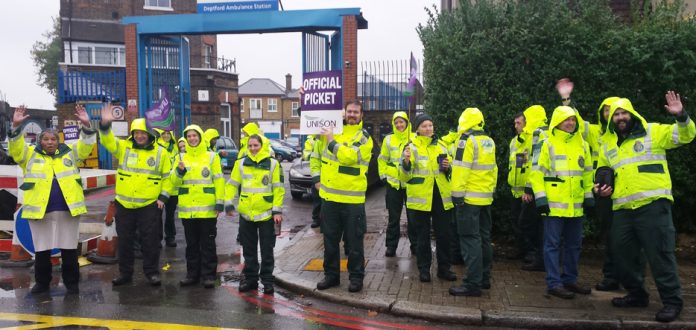
AN AMBULANCE staff shortage has reached such a critical point, GPs warn, that very young and elderly patients are dying before getting to hospital.
This is in no way the fault of the ambulance staff, they explain. The government cuts are so deep that there are simply not enough ambulance workers to do the job. GPs give examples where after calling ambulances for patients, they have had to drive patients to the hospital themselves.
Rehana Azam, national secretary for GMB, the union representing ambulance service staff, said the examples were ‘absolutely shocking’. She said: ‘Ambulance staff are doing their upmost best to respond to this demand but the government is turning the other way. These horrifying case studies are the direct result of years of chronic under-funding of the NHS and Ambulance Service.
‘If we genuinely want a health service we can be proud of – one that provides free, quality care for people at their time of need – we need to fund it properly and invest in the people delivering the service. By Jeremy Hunt’s own admission, the NHS faces painful and difficult economies in the near future, so the problem is only going to get worse.’
Campaign group GP Survival, collected the dossier of examples of patients put at risk because of the chronically understaffed ambulance service. Examples include a GP in England who waited for 45 mins for a 999 ambulance, despite telling call handlers it was likely the patient had unstable angina and/or a myocardial infarction.
Another GP drove a six-month old child with severe respiratory distress due to bronchiolitis to hospital themself after calling 999 and waiting 55 minutes for an ambulance. A GP Survival spokesperson said: ‘If the ambulance service was properly funded, these types of events would not happen. It is without doubt that patients from babies to the elderly are dying unnecessarily in cases like these.’
Performance statistics for English ambulance trusts show worsening in response times, with 71.9% of all ‘Red 1’ calls receiving a response within eight minutes in 2014/15 (the latest available figures), down from 75.6% in 2013/14.
Of the 11 ambulance services in England, just five met or exceeded the 75% standard for this section, compared with eight trusts in 2013/14. The College of Emergency Medicine President Dr Taj Hassan said: ‘These tragic stories highlight the need to urgently tackle the problem. Ambulances are having to wait too long to offload their patients due to overcrowded A&Es, and cannot get back out into the community quickly enough.’
Rachel Verdin GMB officer responsible for South East Coast Ambulance Service NHS Foundation Trust (SECAmb) told News Line yesterday: ‘Thankfully this isn’t something that I am hearing from my paramedics in the SECAmb area, this would be considered a clinical risk. But it is quite frankly terrifying to hear stories like this.
‘The health service is on its knees already, the depth of the cuts that this government seems intent on pushing through is staggering and so outcomes like this are hardly surprising. Whether that is about a shortage of paramedics, beds not being available or a backlog for dropping off for A&Es, the end result is the same and the real impact is felt at the cutting edge and that could be me or you, or our children or our parents. We demand the government properly fund and protect our NHS and ensure that the people who work in it and who do a fantastic job are properly resourced.’
Anna Athow, Deputy Chair London BMA, said: ‘A&Es are being shut down across the length and breadth of the country, compounding this problem is that the ambulance service has been cut to the bone. This has created a perfect storm of cuts resulting in patients’ lives being put at risk. The entire trade union movement must be mobilised to defend the NHS with a general strike to bring this government down. A socialist government would immediately set about resolving the staffing crisis, re-opening all shut departments and hospitals, restoring the NHS and then developing it for the future.’